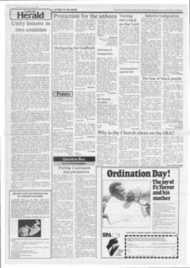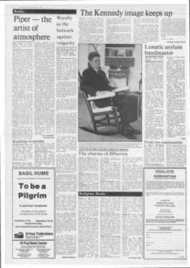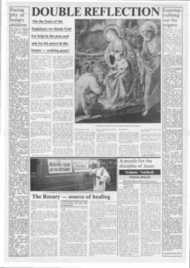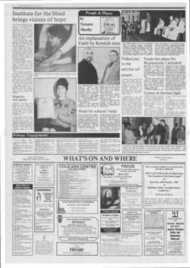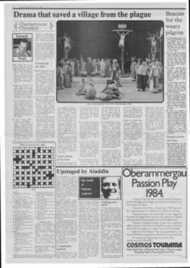Page 2, 6th January 1984
Page 2

Report an error
Noticed an error on this page?If you've noticed an error in this article please click here to report it.
Tags
Share
Related articles
Fighting For Peace Christians Against Atomic Bombs
Cnd A Moral Voice
The Bomb
Coming In From The Cold?
Bishops Call For Total Nuclear Disarmament
Pax Christi Joins New Initiative To Abolish Nuclear Arms
Jerry Filteau outlines Catholic reaction to the nuclear war threat during 1983.
ONE OF the most important Catholic news stories of 1983 both in Great Britain and around the world — was the Church's reactions to the growing threat of nuclear war.
Pope John Paul spoke out on nuclear arms issues several times, and his Secretary of State, Cardinal Agostino Casaroli, delivered a major speech on the topic during a visit to the United States. The head of the Vatican's Congregation for the Doctrine of the Faith, Cardinal Joseph Ratzinger, addressed the issue at length in an interview with a West German national news magazine.
Pope John Paul opened 1983 with a New Year's Day plea to world leaders "to work in common" for a "progressive reduction in armaments, nuclear or conventional." Disarmament cannot be "unilateral," he said, but must be done by "the powers which confront one another . . . in equal measure."
Two weeks later he addressed the same topic in his annual beginning-of-the-year meeting with the Vatican ambassadors of governments around the world. He urged governments to engage in disarmament negotiations, "forcing themselves to achieve, without delay, the maximum reduction."
Close on the heels of the papal pleas came a January meeting of Vatican, United States and European Church representatives in Rome to discuss, behind closed doors, the controversial second draft of the US bishops pastoral on the bomb which had been released the previous October.
Although critics of the pastoral sought to portray the meeting as a high-powered Vatican-European effort to reverse its direction, confidential official reports on the meeting, which were leaked to the press in March, put it in a different light.
Those reports showed that the critiques by European churchmen and Vatican officials were essentially the same as criticisms offered by members of the United States hierarchy in discussing the draft two months earlier.
In the main, these were aimed not at changing the basic directions of the document but at fine-tuning it and clarifying the difference between basic moral principles of Catholic teaching and the prudential application of those teachings to specific nuclear questions.
The third draft of the United States pastoral, released in early April, started another round of stormy headlines and national debate, comparable to those provoked the previous June and October with the distribution of the first two drafts of the letter.
Long before the May 2-3 Chicago meeting at which they finally voted on the pastoral, approving it by a 238-9 margin, the bishops had already achieved one of the chief aims of the pastoral, to make the moral dimensions of tile nuciear deterrence issue an integral part of the public debate on the subject.
`Limited' war
Nor was the debate over the United States pastoral confined to America. In West Germany, where the bishops were at work on their own pastoral, successive drafts of the United States document were translated into German and widely distributed and debated. In France, when Fr Gerard Defois, secretary general of the French Bishops' Conference, was quoted by a Paris daily to the effect that the January Vatican meeting had been a confrontation between American and European bishops, it created a national stir.
He wrote several articles and letters over the next month, repudiating the newspaper article as a misrepresentation of his views and praising the American bishops for their and "valuable" leadership and "courage" in addressing the issues.
When the American bishops finally met in May to amend and vote on the pastoral, a record 450 journalists, or nearly two reporters for every bishop, registered to cover the meeting.
The most substantive changes that the body of bishops made in the final document clearly strengthened their opposition to any nuclear policies or strategies that might allow for first use of nuclear weapons, massive nuclear retaliation to a nuclear attack, or the concept of "limited" nuclear war.
Meanwhile the West German bishops had finished the final touches of their own war and peace pastoral and released it April 27. They clearly took a different approach than their US counterparts in many ways, most notably in their decision not to enter into an explicit moral debate over specific questions of nuclear policy or strategy. They also devoted more space and .emphasis than the US bishops did to the threat of Soviet domination and the political goals of nuclear deterrence, and they expressed greater scepticism about the total pacifist option as a choice for individuals.
In the face of the Soviet totalitarian threat, the West German hierarchy suggested a presumption in favour of the morality of the policies of free, democratic governments, while the US bishops were clearly critical of specific policies currently in place, notably the inclusion of a nuclear first use option in US-NATO "flexible response" defence policy.
But in fundamentals of moral evaluation of nuclear deterrence policy, the West German and US pastorals were closely parallel. Both insisted that deterrence could be accepted only under strict moral conditions, among them that the only immediate goal could be preventing war, not waging it, that any "quest for (nuclear) superiority" was a morally unacceptable policy, and that nuclear deterrence
Immoral quest
policy must have as its final goal politically negotiated progressive disarmament.
Another notable development in May was the appearance of a lengthy interview with Germanborn Cardinal Joseph Ratzinger, prefect of the Vatican's Congregation for the Doctrine of the Faith, by Der Spiegel, a West German national news magazine.
In the eight-page interview Cardinal Ratzinger defended the US bishops' condemnation of the first use of nuclear weapons and said they were right in accepting only a temporary role of a first-use threat in defense policy "on the presupposition that it is made unnecessary as rapidly as possible."
The Cardinal also articulated the Holy See's position in defending the right of bishops' conferences not only to reiterate general Church teachings but to go beyond that and apply those teachings to concrete situations and conditions in their own country.
In June the Dutch bishops added their views on nuclear deterrence by publishing their
Insane reliance
own pastoral letter. Although it was a far shorter letter, less than 10,000 words long, its spirit, thrust and major conclusions were virtually identical to those reached by the US bishops. One of the few significant differences was the greater prominence the Dutch bishops gave to the potential role of the peace movement in creating the political and moral climate in the world for disarmament.
In July the Japanese and Irish bishops added their voices to the chorus of opposition to the arms race.
The Irish bishops called permanent reliance on nuclear deterrence "insane" and declared that current nuclear stockpiles "far exceed any rational estimate of what deterrence requires."
Citing the same "strict conditions" that the US, German and Dutch bishops had said must be met for a nuclear deterrence policy to be morally justifiable, the Irish hierarchy said that if elements of a nation's deterrence policy could not meet those criteria, the country would have a "strict moral obligation" to take steps, unilaterally if necessary, to change its policies.
The bishops of Japan, the only country to have suffered a nuclear attack, called for a halt to all further testing, deployment or production of nuclear weapons, the abolition
of all existing nuclear weapons, and the establishment of nuclear-free zones in East Asia and other parts of the world.
As deployment of US nuclear tactical missiles in NATO countries of Western Europe approached, the Belgian bishops in July defended the deployment of those missiles as a legitimate option if disarmament talks failed, but they urged "new and repeated initiatives . . so that the present disarmament talks succeed.. and make deployment unnecessary.
The Catholic bishops of Scotland that same month joined leaders of other churches in their country to ask the British government to engage in "serious debate" over the planned deployment of "a whole new generation of nuclear arms" in Great Britain.
As the first Euromissiles began to arrive in Britain in November, the bishops of England and Wales issued a statement accepting the principle of nuclear deterrence as an interim policy on the way toward disarmament, but sharply questioning the seriousness of the government's commitment to disarmament in light of the decision to deploy the missiles.
The French bishops were the only ones to strike a significantly different note in the growing tide of anti-nuclear statements by Catholic bishops.
In a statement approved by a nearly unanimous vote in November, the French bishops agreed with others that nuclear deterrence must be "a temporary reponse, to halt a limited situation which we must get out of as soon as possible," but the major thrust of their document was to defend the legitimacy of nuclear deterrence While France is one of the world's five major nuclear powers, it is not a member of the NATO alliance. Its independent nuclear force is far inferior to that of the Soviet Union and could only be used for defensive purposes as a deterrent In the course of 1983 Pope John Paul Il made no major analytical statements about the morality of nuclear deterrence but spoke on a number of occasions about the dangers of arms race and about the incentive that "the frightening spectre of nuclear holocaust" should give to peace efforts.
blog comments powered by Disqus





